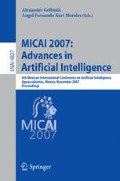Abstract
The main goal of requirements specification is the transformation of a “rough draft” of stakeholder needs and expectations into a semi-formal specification, represented by several diagrams, commonly UML diagrams. These diagrams must be consistent with each other, but consistency among different UML diagrams is not defined by the UML specification, and the research about inter-model consistency is still immature. We propose, in this paper, a rule-based system to detect consistency problems among UML diagrams. In order to complete this task, we have defined a set of rules in OCL, and then we use a novel approach for implementing the system by means of Xquery and Xpath languages. The use of these languages helps the rule-based system to interact with traditional CASE tools.
Access this chapter
Tax calculation will be finalised at checkout
Purchases are for personal use only
Preview
Unable to display preview. Download preview PDF.
References
Jackson, M.: Software Requirements & Specifications: a lexicon of practice, principles and prejudices. Addison Wesley, Great Britain (1995)
Zowghi, D., Gervasi, V.: The Three Cs of requirements: consistency, completeness, and correctness. In: International Workshop on Requirements Engineering: Foundations for Software Quality, Essen, pp. 155–164. Essener Informatik Beitiage, Germany (2002)
OMG – Object Management Group. http://www.omg.org
Chiorean, D., Pasca, M., Carcu, A., Botiza, C., Moldovan, S.: Ensuring UML models consistency using the OCL Environment. In: Sixth International Conference on the Unified Modelling Language - the Language and its applications, San Francisco (2003)
Glinz, M.: A lightweight approach to consistency of Scenarios and Class Models. In: En: Fourth International Conference on Requirements Engineering, Illinois, USA, June 10-23 (2000)
Gryce, C., Finkelstein, A., Nentwich, C.: Lightweight Checking for UML Based Software Development. In: Workshop on Consistency Problems in UML-based Software Development. Dresden, Germany (2002)
Kösters, G., Pagel, B.-U., Winter, M.: Coupling Use Cases and Class Models. In: BCS FACS/EROS Workshop on Making Object-oriented Methods more Rigorous, London (1997)
Liu, D., Subramaniam, K., Far, B.H., Eberlein, A.: Automating transition from use-cases to class model. In: IEEE CCECE 2003. Canadian Conference on Electrical and Computer Engineering, vol. 2, pp. 831–834 (2003)
Shishkov, B., Xie, Z., Lui, K., Dietz, J.: Using norm analysis to derive use case from business processes. In: 5th Workshop on Organizations semiotics, Delft the Netherlands, June 14-15, 2002 (2002)
Buhr, R.J.A.: Use Case Maps as Architectural Entities for Complex Systems. IEEE Transactions on Software Engineering 24(12), 1131–1155 (1998)
Sunetnanta, T., Finkelstein, A.y.: Automated Consistency Checking for Multiperspective Software Specifications. In: Proceedings of the 26th Australasian computer science conference, vol. 16, pp. 291–300 (2003)
Ligêza, A.: Logical Foundations of Rule-Based Systems. Studies in Computational Intelligence (SCI) 11, 191–198 (2006)
W3C – World Wide Web Consortium. http://www.w3.org
XML – Extensible Markup Language. http://www.w3.org/XML
Travers, N., Dang, T.: An Extensible Rule Transformation Model for XQuery Optimization. In: ICEIS. International Conference on Enterprise Information Systems, INSTICC, Madeira (2007)
Pal, S., Istvan, C., Seeliger, O., Rys, M., Schaller, G., Yu, W., Tomic, D., Baras, A., Berg, B., Churin, D., Kogan, E.: XQuery implementation in a relational database system. In: Proceedings of the 31st international conference on Very large data bases, pp. 1175–1186. Trondheim, Norway (2005)
Che, D., Aberer, K., Özsu, M.: Query optimization in XML structured-document databases. The VLDB Journal 15(3), 263–289 (2006)
Almendros, J., Becerra, A., Enciso, F.: Magic Sets for the XPath Language. Journal of Universal Computer Science 12(11), 1651–1678 (2006)
Eguchi, G., Leff, L.: Rule-based XML: Rules about XML in XML To Support Litigation Regarding Contracts. Artificial Intelligence and Law 10, 283–294 (2002)
Schaffert, S., Xcerpt, A.: Rule-Based Query and Transformation Language for the Web. PhD thesis, University of Munich (2004)
Author information
Authors and Affiliations
Editor information
Rights and permissions
Copyright information
© 2007 Springer-Verlag Berlin Heidelberg
About this paper
Cite this paper
Zapata, C.M., González, G., Gelbukh, A. (2007). A Rule-Based System for Assessing Consistency Between UML Models. In: Gelbukh, A., Kuri Morales, Á.F. (eds) MICAI 2007: Advances in Artificial Intelligence. MICAI 2007. Lecture Notes in Computer Science(), vol 4827. Springer, Berlin, Heidelberg. https://doi.org/10.1007/978-3-540-76631-5_21
Download citation
DOI: https://doi.org/10.1007/978-3-540-76631-5_21
Publisher Name: Springer, Berlin, Heidelberg
Print ISBN: 978-3-540-76630-8
Online ISBN: 978-3-540-76631-5
eBook Packages: Computer ScienceComputer Science (R0)

